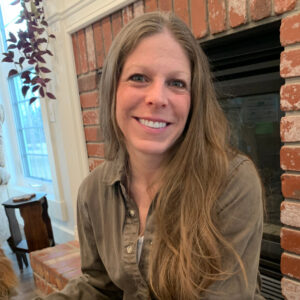Tamara Kramer was enticed to King’s from Calgary, Alberta, partly because she was intrigued by King’s history, but also because her MFA in Fiction meant growing her novelist skills in her favourite writing form.
 What drew you to King’s?
What drew you to King’s?
Having spent most of my life on the Prairies, the idea of living on the East Coast, even for a few days, was enticing. That King’s is Canada’s oldest English-speaking university added to the allure—what history-lover wouldn’t be drawn to such a place!
What program are you graduating from, and what inspired you to pursue that program?
I am graduating from the Master of Fine Arts (MFA) in Fiction program. It has been an incredible two years, and I’m thankful to have been a part of this brand-new program!
I pursued my MFA at King’s because I appreciated its low-residency structure, which meant I could complete my education without completely neglecting my family and other “real-life” responsibilities! I was also attracted to the program’s singular focus on fiction, allowing me to immerse myself in my favourite writing form and grow my novelist skills. Finally, the program’s intent to help each student produce a full-sized piece of fiction was both enticing and inspiring.
Was there a course, professor, reading requirement or experience that has had a lasting impact on you?
I would say the time spent with my mentors, in-person and online, has had the most significant and lasting impact on me. Each mentor (I worked with three) provided unique and personal instruction and feedback, benefiting both my current work-in-progress and all my writing in the future.
What item got the most use during your degree (ex: headphones, water bottle, a specific hoodie, a certain app?)
My answer to this question is boring: my laptop. Over the last two years, my laptop has gone with me almost everywhere. I did schoolwork, wrote my book and attended workshops all across Canada—at volleyball tournaments, gymnastics competitions, on the train, plane and ferry. Sometimes I wrote at my desk or the kitchen table or in coffee shops, but more often than not, I wrote in my ‘car office.’ If I had to sit at home in front of a desktop, I wouldn’t have gotten anything done!
Do you do your best work at night or in the morning?
I tend to write at any time of the day out of necessity, but I especially love writing at night when the house is quiet and the lights are all off except for the small glow of lamplight at my desk. Something about the stillness allows me to truly interact with my characters, encouraging my best words to come.
If you could relive one day from your time at King’s, what day would it be and why?
I would relive the first minutes of the first day of the first June residency; walking into Alumni Hall with the realization that I was about to start my MFA is a feeling I’ll never forget. I’m not sure when I’ll ever again experience that degree of excitement mingled with disbelief and apprehension, along with the knowledge that I was part of a group of such incredible writers. I experienced more than a little bit of impostor syndrome!
What’s one thing from your time at King’s that you’re especially proud of?
After remembering what it was like to stare at a blank computer screen, the cursor blinking at the start of my novel’s first paragraph, the overwhelm of knowing that I had to write something, but had no idea what, I’m incredibly proud of handing in my 80,000 words!
Thinking back to who you were when you received your acceptance letter, what would you tell her?
I would tell that self to slow down and meander a little, enjoy the detours along the way! Of course, there were times over the last two years when the workload of assignments, deadlines, word counts and obligations felt overwhelming, but looking back, it all went by so quickly. Now I wish I had more time, more opportunity to learn, more deadlines to push my writing to the finish line.
As Encaenia approaches, do you have any insights you’d like to share with incoming students?
The most important insight I have to share with incoming students is this: develop a small writing community from among your classmates. Once you establish this group, nurture it and be committed to meeting regularly, either online or in-person. No doubt, a writing group takes effort, but it is incredibly valuable and worthwhile. This circle of fellow student writers will become your supporters, encouragers and advisors; your workshoppers, brainstormers and cheerleaders. I am so thankful for the group I’ve been a part of. They’ve become vital to me, discussing assignments, discovering the cure to writer’s block or just needing other writers to celebrate with. A writing group will add to the wonder and richness of your MFA experience.
Where do you hope your degree takes you next?
My priority right now is to finish my book and find an agent to take it to the next step for publication. After this work-in-progress has found its place, I look forward to starting the research for my next historical fiction project. In addition to my creative work, I hope my degree will open opportunities for me to teach writing and eventually present at conferences or workshops.

